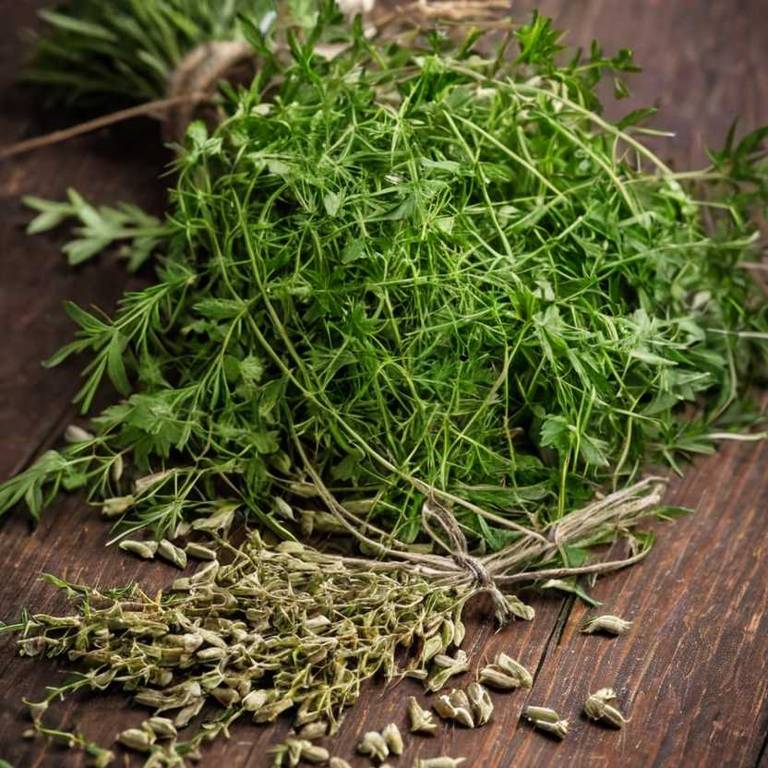Shepherd'S Purse (Capsella Bursa-Pastoris)
Information Reliability Score: 5/10
This score reflects the overall reliability of the information presented in this article. It is based on the quality of scientific evidence, accuracy of sources, and the transparency of references related to Capsella bursa-pastoris.
 Shepherd's Purse, scientifically known as Capsella bursa-pastoris, is a medicinal herb with a long history of use in traditional medicine, particularly in Europe and Asia. It is valued for its ability to support women's health, especially during menstruation, due to its antispasmodic and astringent properties. The plant contains compounds like rutin and essential oils that contribute to its benefits, including reducing inflammation and promoting digestive health. Traditionally, it has been used to ease menstrual cramps, manage bleeding, and as a remedy for urinary tract infections. In modern wellness practices, Shepherd's Purse is also incorporated into herbal formulations for its potential antioxidant and anti-inflammatory effects, making it a versatile herb with both historical and contemporary significance.
Shepherd's Purse, scientifically known as Capsella bursa-pastoris, is a medicinal herb with a long history of use in traditional medicine, particularly in Europe and Asia. It is valued for its ability to support women's health, especially during menstruation, due to its antispasmodic and astringent properties. The plant contains compounds like rutin and essential oils that contribute to its benefits, including reducing inflammation and promoting digestive health. Traditionally, it has been used to ease menstrual cramps, manage bleeding, and as a remedy for urinary tract infections. In modern wellness practices, Shepherd's Purse is also incorporated into herbal formulations for its potential antioxidant and anti-inflammatory effects, making it a versatile herb with both historical and contemporary significance.
FREE CHECKLIST
The Only 10 Herbs You Need to Heal 90% of Common Ailments.

Table of Contents
Scientific and Botanical Profile
Shepherd's Purse, with botanical name Capsella bursa pastoris, is a flowering plant belonging to the Brassicaceae family, commonly known as the mustard family. Native to regions such as Europe, Asia, North Africa, the Middle East, Turkey, Southern Europe, and Central Asia, this plant has been widely naturalized in various parts of the world. Morphologically, it is an annual herb with a basal rosette of pinnately lobed leaves and a slender, branching stem that bears small, yellowish-white flowers arranged in racemes. The plant produces distinctive triangular seed pods that resemble a purse or a heart, giving rise to many of its common names, including Bishop's Purse, Little Heart, and Shepherd's Purse. It is also known by other names such as Cabbage Mustard, Bishop's Candle, and Poxweed, reflecting its historical and regional significance in traditional medicine and folklore.History and Cultural Relevance
Shepherd's Purse was used by ancient civilizations such as the Greeks, Romans, and Chinese for its medicinal properties, with records dating back to at least 400 BCE. In traditional medicine systems like Ayurveda and Chinese medicine, it has been valued for its ability to ease menstrual cramps, reduce inflammation, and support digestive health. The plant also held cultural significance in European folklore, where it was believed to bring good fortune and was often used in wedding ceremonies and as a symbol of prosperity. In some regions, it was carried as a protective charm against evil spirits, and its seeds were used in rituals to ensure a bountiful harvest. Today, Shepherd's Purse remains a popular remedy for menstrual pain and is still used in herbal teas and supplements, reflecting its enduring relevance in both traditional and modern health practices.Chemical Composition and Nutritional Profile
Shepherd's Purse contains a variety of bioactive compounds, including alkaloids such as sinapine and saponins, along with flavonoids like quercetin and kaempferol, which contribute to its medicinal properties. It is also rich in essential oils containing terpenes, which may support its anti-inflammatory and antimicrobial effects. Nutritionally, Shepherd's Purse is a good source of vitamins C and A, as well as minerals like potassium, calcium, and iron, making it a nutrient-dense plant. The presence of antioxidants helps neutralize free radicals in the body, potentially reducing oxidative stress and supporting immune function. Its mechanism of action involves modulating physiological processes through these compounds, which may aid in digestive health, uterine tone regulation, and blood pressure management.Medicinal Properties and Health Benefits
Capsella bursa pastoris has been traditionally used for its anti-inflammatory and antioxidant properties, which support overall immune function and help combat oxidative stress. It is particularly beneficial for the respiratory and cardiovascular systems, aiding in reducing inflammation in the lungs and improving blood circulation. Compared to similar herbs like Echinacea or Turmeric, Capsella bursa pastoris offers a more subtle yet consistent effect, with a lower potency that makes it suitable for long-term use without causing gastrointestinal irritation. Its unique advantage lies in its ability to support both internal and external healing, making it a versatile choice for skin conditions and minor wounds. Overall, it stands out for its gentle yet effective action, complementing other herbal remedies in promoting holistic health.Discover the 10 best health benefits of Shepherd'S Purse.